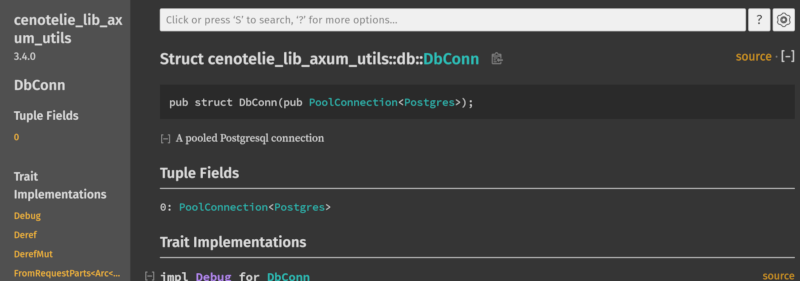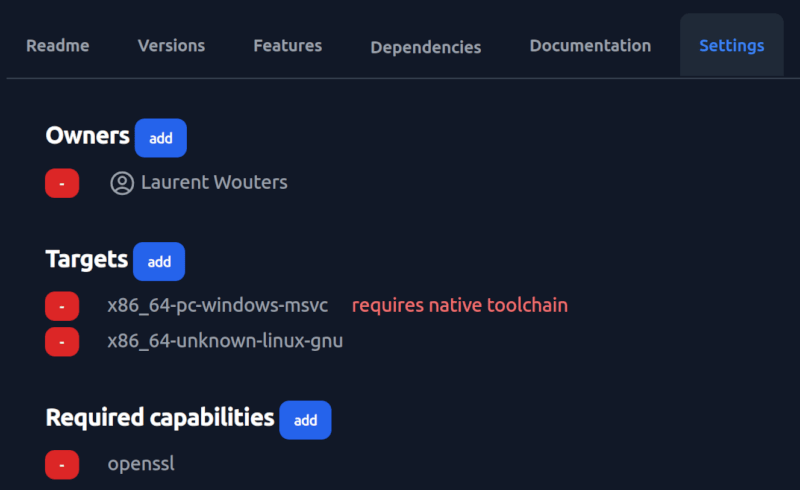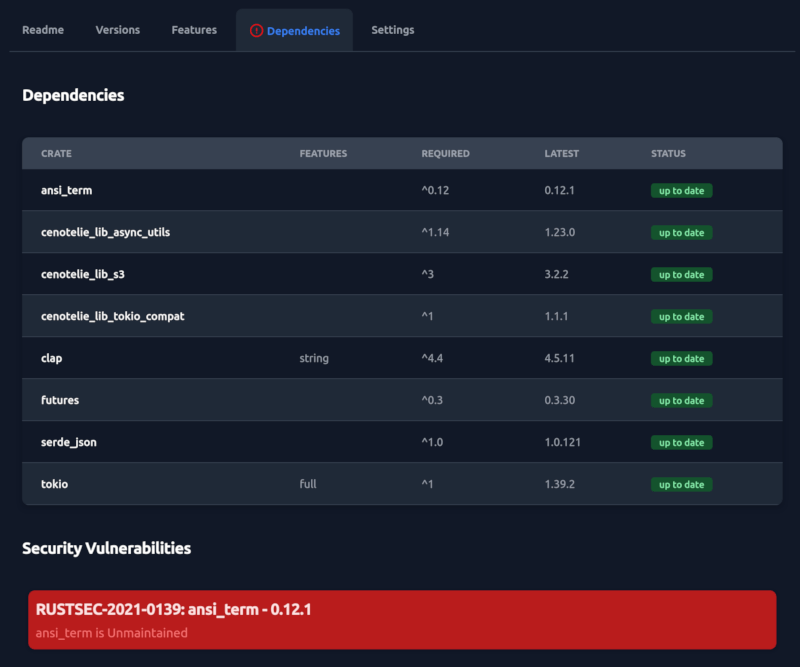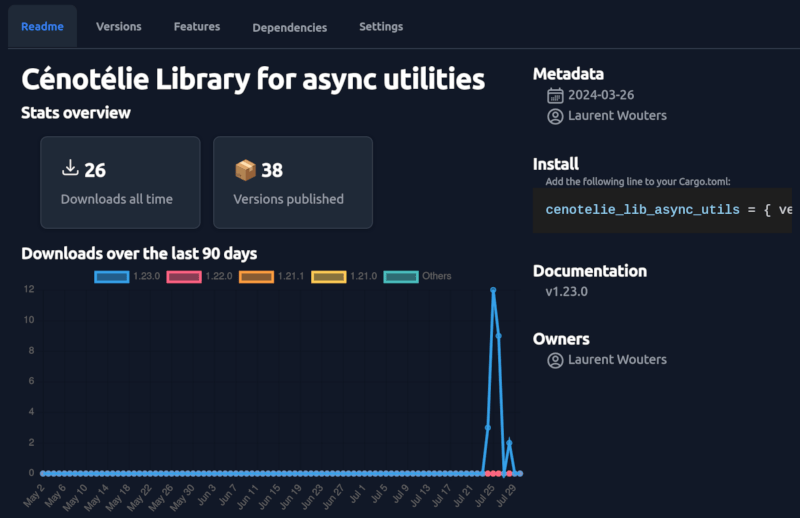13 stable releases
| 1.11.1 | Nov 7, 2024 |
|---|---|
| 1.10.1 | Sep 12, 2024 |
| 1.8.0 | Jul 30, 2024 |
#66 in HTTP server
1MB
10K
SLoC
Quickstart
To launch an empty registry using a pre-built docker image, get the latest docker-compose.yml file and start it:
git clone https://github.com/cenotelie/cratery
cd cratery
docker compose up -d
Then, connect to http://localhost/. In the default configuration, a Google account must be used.
The first ever user to log in automatically obtains administration rights. He/she is then responsible to setup an admin team.
Once connected, a token for CLI usage in Cargo can be obtained by going to http://localhost/webapp/account.html and clicking on the Create new token button.
Tokens can be restricted to read access, e.g. for CI purposes.
For publishing crates, a token with write accesses must be obtained.
The name of the token is just a convenience.
On creation, a popup appear with information about how to register this token for Cargo.
Features
Authentication
Authentication is handled using OAuth out of the box. Simply connect your organisation's provider. On the default configuration, Google is configured as a provider. This is only appropriate for demonstration purposes.
Administration
Administrate owners for hosted crates.

Docs generation
Cratery automatically generates and serves the documentation for published crates.

Cratery now supports worker nodes for the execution of documentation generation jobs, as well as the configuration of crates so that the documentation can be generated:
- for specific targets (instead of the host by default),
- possibly requiring a native host for specific targets (for example a native Windows node for the
x86_64-pc-windows-msvctarget), - using nodes with identified capabilities, for example specific system libraries.

Dependency analysis
Cratery automatically scans the dependency graph of the latest versions (for each major version) of hosted crates. Cratery detects outdated direct dependencies and gives the latest version number to use instead. Cratery also audits the complete dependency graph to find dependencies, direct or indirect, that are affected by vulnerabilities published by the RustSec group.
Cratery can send notifications by emails to the crates' owners when a issue is discovered. Analysis are also performed on-demand on each crate's page.


Statistics
Cratery also tracks downloads to give you statistics about the usage of your crates.

Configuration
Configuration is passed through environment variables. See docker-compose.yml for all values.
General
REGISTRY_WEB_PUBLIC_URI: The URI at which the registry will be available.REGISTRY_WEB_COOKIE_SECRET: The secret key for the private cookie set bycrateryto track connected users.
Authentication
Authentication on cratery is archived with OAuth and configured with the REGISTRY_OAUTH_* environment variables.
The docker-compose.yml file contains the basic configuration to use Google as the authentication provider.
This is allowed only for cratery instances exposed on localhost for evaluation and testing purposes.
This configuration must be changed to use your own OAuth identity provider.
REGISTRY_OAUTH_LOGIN_URI: URI to redirect to when attempting to log in.REGISTRY_OAUTH_CALLBACK_URI: URI oncraterythe user will be redirected to on successful login on the identity provider.REGISTRY_OAUTH_TOKEN_URI: URIcraterywill connect to for obtaining an authorization token from the identity provider.REGISTRY_OAUTH_USERINFO_URI: URIcraterywill connect to for obtaining the user information from the identity provider when a user logged in.REGISTRY_OAUTH_USERINFO_PATH_EMAIL: The path to the email field in the JSON blob returned by the identity provider as the user information.REGISTRY_OAUTH_USERINFO_PATH_FULLNAME: The path to the full name field in the JSON blob returned by the identity provider as the user information.REGISTRY_OAUTH_CLIENT_ID: The client ID to use when connecting to the identity provider.REGISTRY_OAUTH_CLIENT_SECRET: The client secret to use when connecting to the identity provider.REGISTRY_OAUTH_CLIENT_SCOPE: The scope to request when redirecting to the identity provider.
Storage
The persisted data for cratery is:
- An sqlite database,
- The index git repository,
- The actual crates packages and metadata,
- The generated documentation of stored crates.
By default, all data is stored in a single directory specified by the REGISTRY_DATA_DIR environment variable.
The default value is a /data folder, expected to be mounted into the docker container.
In addition, cratery uses git and Cargo and expect their respective configuration to appear in a home directory.
This directory can be configured using the REGISTRY_HOME_DIR environment variable.
If this variable is not set, cratery looks for the HOME environment variable and then fallback to a default value of home/cratery expecting to run within a docker container.
The crates data and their generated documentation can be stored on S3 instead. This is controlled by the following configuration :
REGISTRY_STORAGE: Eitherfs(default) to store in theREGISTRY_DATA_DIRfolder ors3to store on an S3 bucket.REGISTRY_STORAGE_TIMEOUT: Timeout (in milli-seconds) to use when interacting with the storage, defaults to 3000REGISTRY_S3_URI: Endpoint base URI for the S3 service.REGISTRY_S3_REGION: Sub-domain for the region.REGISTRY_S3_ACCESS_KEY: The access key to use, set to empty string to search for existing credentials.REGISTRY_S3_SECRET_KEY: The secret key to use, set to empty string to search for existing credentials.REGISTRY_S3_BUCKET: The S3 bucket to use for storage. It will be created if it does not exist.REGISTRY_S3_ROOT: The prefix to use for storing the data in the bucket (e.g./cratery/), if not set or set to empty string, data will be stored in the root of the bucket.
Index
The index can be served using both the legacy git and the new sparse protocols, see Registry Protocols.
The legacy git protocol is disabled by default, and the new sparse protocol enabled:
REGISTRY_INDEX_PROTOCOL_GIT, defaults tofalseto de-activate the legacygit"smart" protocol. Usetrueto activate.REGISTRY_INDEX_PROTOCOL_SPARSE, defaults totrueto activate thesparseprotocol. Any other value deactivates it.
Fetching the index always requires authentication, regardless of the used protocol.
The index for the registry is managed as a git repository.
When cratery commits to this repository as an author:
REGISTRY_GIT_USER_NAMEis the username to use,REGISTRY_GIT_USER_EMAILis the email to use.
The git repository for the index can be synchronized with an externally hosted git repository with:
REGISTRY_GIT_REMOTE: The URI to the remote git repository to use. It will be cloned on startup (or changes pulled from if already present).REGISTRY_GIT_REMOTE_SSH_KEY_FILENAME: path and filename of the SSH key to use to authenticate to the remote host.REGISTRY_GIT_REMOTE_PUSH_CHANGES: If set totrue, changes will be automatically pushed to the remote repository to keep the remote in sync.
Docs generation
When generating the documentation for stored crates:
REGISTRY_SELF_LOCAL_NAMEis the name of the registry for Cargo. It should match the name used to upload the crates.
cratery will automatically link to docs.rs for dependencies on crates.io.
Dependencies to crates also hosted on the same cratery instance will be recognized using the REGISTRY_WEB_PUBLIC_URI value.
External private registries so that documentation can be generated and the dependencies' docs linked against.
This is specified with the following environment variables.
{index} is a number that starts at 1 for the first external registry.
REGISTRY_EXTERNAL_{index}_NAME: The name of the registry for Cargo.REGISTRY_EXTERNAL_{index}_INDEX: The URL to the registry's indexREGISTRY_EXTERNAL_{index}_DOCS: The URL prefix to use for links to documentation for crates on this registry.REGISTRY_EXTERNAL_{index}_LOGIN: The login that Cargo will use to get crates from the registry.REGISTRY_EXTERNAL_{index}_TOKEN: The associated token.
Dependency analysis
When performing dependency analysis, Cratery will access crates.io and other external registries.
REGISTRY_DEPS_CHECK_PERIOD: Period in seconds to wait between checking for crates that need to be analyzed.REGISTRY_DEPS_STALE_REGISTRY: Number of milliseconds after which the local data about an external registry are deemed stale and must be pulled again. Defaults to 60000 (1 minute).REGISTRY_DEPS_STALE_ANALYSIS: Number of minutes after which the saved analysis for a crate becomes stale. Defaults to 1 day. A negative number deactivates background analysis of crates.REGISTRY_DEPS_NOTIFY_OUTDATED: Whether to send a notification by email to the owners of a crate when some of its dependencies become outdated, defaults tofalse. To activate, set totrue.REGISTRY_DEPS_NOTIFY_CVES: Whether to send a notification by email to the owners of a crate when CVEs are discovered in its dependencies, defaults tofalse. To activate, set totrue.REGISTRY_EMAIL_SMTP_HOST: The host for sending mails.REGISTRY_EMAIL_SMTP_PORT: The port for sending mails.REGISTRY_EMAIL_SMTP_LOGIN: The login to connect to the SMTP host.REGISTRY_EMAIL_SMTP_PASSWORD: The password to connect to the SMTP hostREGISTRY_EMAIL_SENDER: The address to use a sender for mailsREGISTRY_EMAIL_CC: The address to always CC for mails
Worker nodes
Documentation jobs do not have to be executed on the server, although this is the default setup.
They can be delegated to worker nodes and the main server will act as the master.
A worker node is just another instance of cratery, configured with a specific role.
The role of a node is configured as follow:
REGISTRY_NODE_ROLE: By default, a node is in standalone mode, neither a master nor a worker. Documentation jobs are run on the node. Forcrateryinstances that want to have worker nodes, the role must be set to"master". Worker nodes in turn must have a role set to"worker".REGISTRY_NODE_WORKER_TOKEN: for both master and worker nodes, this variable must be set to the same value. This is the secret token that workers will use to connect to their master node.REGISTRY_NODE_WORKER_NAME: for workers only, the user-friendly name of the worker.REGISTRY_NODE_MASTER_URI: for workers only, the web socket URI to the master, for examplewss://cargo.mycompany.com.REGISTRY_NODE_WORKER_CAPABILITIES: for workers only, a comma-separated list of capabilities provided by the worker. Crates can then be configured to require specific capabilities. For example the presence ofopensslon the system.
Contributing
Contributions are welcome!
Open a ticket, ask a question or submit a pull request.
License
This project is licensed under the MIT license.
Dependencies
~75MB
~1.5M SLoC